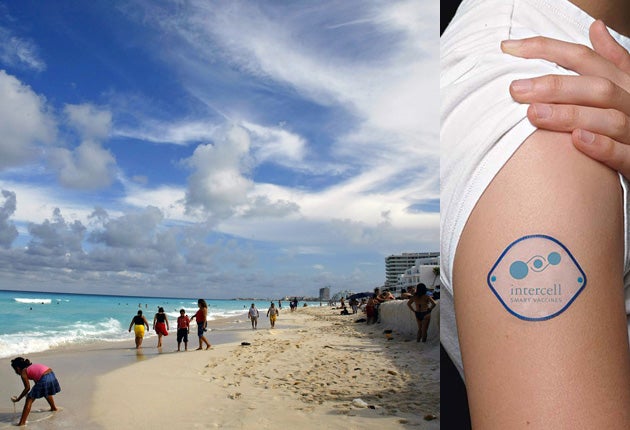Wanted: volunteers for free week-long holidays in Mexico
(Will be expected to spend days in hotel bathroom with very upset stomach)

Fancy a free holiday in Mexico, all expenses paid? Or perhaps Guatemala appeals? Flights and hotel accommodation up to the value of €1,600 (£1,400) are on offer for 900 volunteers who are prepared to test a remedy for one of the most common holiday afflictions – travellers' diarrhoea.
In a novel twist on the usual drug company trial in which volunteers are paid to attend a clinic and be injected with a new agent to see how they react, the "Trek Study" sponsored by Intercell, a US vaccine manufacturer, is instead despatching willing backpackers to a part of the world where the bacteria that cause runny tummies are rife.
Volunteers will stay in three-star hotels but can choose where they go and what they eat and drink, provided they do not stray more than three hours' travelling time from one of the centres in Mexico or Guatemala where they are required to attend for blood tests and to provide stool samples if they develop an upset stomach.
A second study is planned of travellers to India, for which recruitment has not yet started.
Thomas Lingelbach, chief executive of Intercell, said the company hoped to obtain a global licence for the product. "We need to show the vaccine is effective in different geographical settings, as the bacteria that cause diarrhoea are different in different regions. If we can show broad coverage against travellers' diarrhoea we estimate we could get peak sales of €500m a year in five to 10 years."
Drug trials were popular with students as a way of boosting meagre bank balances until the 2006 catastrophe in which six volunteers nearly died at Northwick Park Hospital in north-west London – and one was described by his girlfriend as looking "like the Elephant Man" – after a trial of a monoclonal antibody, TGN1412, went disastrously wrong.
That was a Phase 1 trial – the first time the drug had been tested in humans. The travellers' diarrhoea vaccine has already been tested on humans and an initial study with 170 American volunteers, who also travelled to Mexico and Guatemala, was encouraging. Half were given the vaccine and half a placebo, and results published in The Lancet medical journal last year showed it reduced the incidence of diarrhoea by 75 per cent.
Travellers' diarrhoea lasts on average for four to five days, involves 18 trips to the toilet and leaves sufferers dehydrated and debilitated. It blights millions of holidays every year with stomach cramps, nausea and vomiting. In The Lancet study, 21 per cent of those given the placebo had a moderate to severe attack of diarrhoea compared with 5 per cent of those who received the vaccine.
For the new study, volunteers aged 18 to 64 are being recruited in Germany as well as the UK and 200 of the total 1,800 sought in both countries have so far signed up, according to Intercell. The British study is being co-ordinated by the Hospital for Tropical Diseases in London and recruitment clinics have been established in Belfast, Glasgow, Manchester, Birmingham, Reading and London. Mr Lingelbach said: "We don't expect any issues on the recruitment side. We want recruitment to pick up during the [Mexican] wet season – spring to summer in the UK – because incidence rates [of diarrhoea] are highest then."
The vaccine is delivered through a patch worn on the arm for six hours three weeks prior to travelling, followed by a booster dose delivered via a second patch one week before travelling. Volunteers are required to attend for blood tests and given a kit to collect stool samples.
Nigel Thomas, clinical director at Intercell, said: "We are looking for people who have already planned to go to Mexico or Guatemala and think this would add another interesting aspect. We cover their expenses – flights and accommodation – nothing beyond that.
"It is almost like going on a package holiday. They will be met by a concierge who will take them to their hotel and arrange for them to give their first blood sample within 48 hours. We need them to agree to be co-operative. Everyone has heard of travellers' diarrhoea."
Dr Thomas agreed that results of the study could be imperilled if volunteers chose to eat only in five-star hotels. "If a traveller is interested in the country they will end up eating outside hotel restaurants," he insisted.
Subscribe to Independent Premium to bookmark this article
Want to bookmark your favourite articles and stories to read or reference later? Start your Independent Premium subscription today.

Join our commenting forum
Join thought-provoking conversations, follow other Independent readers and see their replies